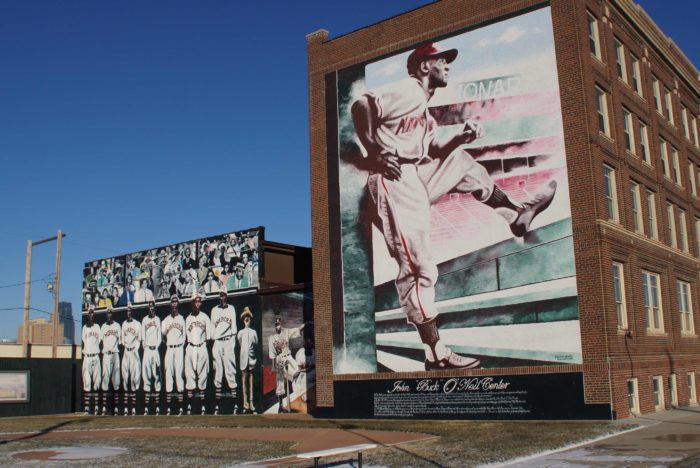A dominant theme at the end of Buck O’Neil’s life, and since his death, is his exclusion from the Baseball Hall of Fame.
An interesting, and sad, conclusion of The Soul of Baseball is the 2006 election of Negro Leaguers to Cooperstown in what certainly appears to be the last attempt by the Hall to induct worthy individuals excluded from the major leagues by segregation.
Author Joe Posnanski was with O’Neil at the moment he learned he’d been left out of the Hall. The Topeka & Shawnee County Public Library is sponsoring a community read of The Soul of Baseball, and has dozens of copies available. I will participate in a group discussion of the book on Feb. 16. Then author Joe Posnanski will be at the library on Feb. 17 to talk about O’Neil, the book and his experiences.
O’Neil’s case for the Hall was not based on his greatness as a player. He himself admitted that he wasn’t one of the greatest to play in the Negro Leagues. But he was a successful Negro League manager, a pioneer as a scout and coach in the major leagues, and finally a heroic ambassador for pre-integration black baseball. It was his work preaching healing and unity that won over people’s hearts and bolstered his case for the Hall.
In 2006, O’Neil made it through the screening process and the initial vote to reduce the number of candidates. But he fell short in the final vote.
If he were to be inducted in the future, O’Neil’s case would have to receive unique consideration. It would require the voters to consider the sum total of his lifetime achievements.
There are five Negro Leaguers who have been inducted into the Hall of Fame for contributions outside of the field of play. Of those five, four were owners: Effa Manley, Alex Pompez, Cum Posey and J.L. Wilkinson.
The fifth – Sol White – has credentials somewhat similar to O’Neil’s. White was one of the top managers in black baseball early in the 20th Century. He is best known for writing a book recording the history of black baseball prior to 1907.
But White was also considered one of the best players of his era – approximately 1887 to 1901. Unlike O’Neil, White’s play alone would have merited his consideration for the Hall of Fame.
It is sad that Cooperstown didn’t view the whole of O’Neil’s accomplishments as worthy of inclusion. But to include him would have required quite a diversion from their normal course of only including the very best players.
There are 30 men in the Hall of Fame based almost entirely on their Negro League play. Interestingly, the order in which they were inducted serves as an unofficial ranking, indicating which players voters deemed most deserving:
Satchel Paige – 1971 (played some in the majors, but his induction is almost entirely based on his Negro League career)
Josh Gibson – 1972
Buck Leonard – 1972
Monte Irvin – 1973 (voted in by the special committee on the Negro Leagues and the Pre-Negro Leagues, Irvin is the only man in the Hall of Fame whose merits in the Negro Leagues and the major leagues are essentially equal)
Cool Papa Bell – 1974
Judy Johnson – 1975
Oscar Charleston – 1976
Martin Dihigo – 1977
Pop Lloyd – 1977
Rube Foster – 1981
Ray Dandridge – 1987
Leon Day – 1995
Bill Foster – 1996
Willie Wells – 1997
Bullet Rogan – 1998
Smokey Joe Williams – 1999
Turkey Stearnes – 2000
Hilton Smith – 2001
Ray Brown – 2006
Willard Brown – 2006 (like Paige, he played some in the majors, but his induction is based entirely on his Negro League career)
Andy Cooper – 2006
Frank Grant – 2006
Pete Hill – 2006
Biz Mackey – 2006
Jose Mendez – 2006
Louis Santop – 2006
Mule Suttles – 2006
Ben Taylor – 2006
Cristobal Torriente – 2006
Jud Wilson – 2006
There are six Negro Leaguers in the Hall of Fame for their play in the major leagues:
Jackie Robinson – 1962
Roy Campanella – 1969 (had a relatively significant Negro League career as a young player before coming to the major leagues)
Ernie Banks – 1977
Willie Mays – 1979
Hank Aaron – 1982
Larry Doby – 1998 (similar to Campanella, Doby had a relatively significant Negro League career as a young player before coming to the major leagues)
